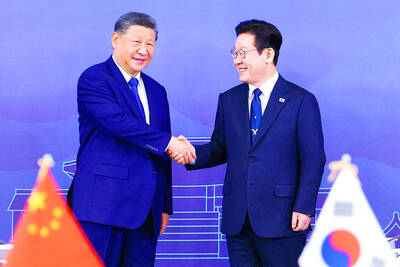Dozens of villagers remained in shelters yesterday as aftershocks rattled a region in central Japan hit by a weekend earthquake that injured at least 41 people and destroyed more than 50 homes.
The damage in a mountainous area that hosted the 1998 Winter Olympics was worse than initially thought, though many were rejoicing at the lack of any deaths.
At least 20 people, including one two-year-old, were pulled from homes toppled by the magnitude 6.7 earthquake late on Saturday night.
“Words cannot express my gratitude,” Kimito Tsutaki, 73, told national broadcaster NHK after she was pulled from her quilt bedding.
Neighbors used a car jack to lift collapsed timbers from on top of her.
Seven of the injured had broken bones, many after being crushed by heavy furniture as they slept on their tatami floors.
Some residents said they used the flashlights on their mobile phones to find their way to safety in the pitch dark.
Local experts said the structure of the mostly wooden houses, which are built to withstand heavy, wet snow in the winter, helped prevent more casualties.
“Houses in that area are built with many strong supports and that may be a reason why there was not more damage,” Reiji Tanaka, a professor emeritus at Tohoku University of Technology, told the Yomiuri Shimbun.
The quake struck west of Nagano at a relatively shallow depth of 5km in an area prone to strong earthquakes due to an active fault, experts at the Japan Meteorological Agency reported.
The agency reported nearly 80 aftershocks by midday yesterday.
The same area was struck by a magnitude 6.7 earthquake the day after the March 2011 quake and tsunami that devastated a long stretch of Japan’s northeastern coast, killing about 19,000 people.
The disaster affected a relatively sparsely populated area, but renewed concerns over preparedness for major earthquakes in major cities such as Tokyo.
The Asahi Shimbun cited local governments saying that most of the towns likely to be affected by a major quake expected to strike off Japan’s eastern coast were not prepared to provide emergency housing. Land for such facilities is in extremely short supply.
The hardest-hit area appeared to be Hakuba, where at least 43 homes were destroyed and 17 people were injured, national and local disaster agencies said.
Another seven homes were lost in Otari, a nearby village to the north. Non-residential buildings were also destroyed, with officials assessing the extent of the damage.
Many parts of rural Japan are occupied mostly by elderly people, many of them living on their own. After a 2004 earthquake to the north in Niigata, communities organized teams to ensure that no victims would be stranded or unaccounted for.

‘CHILD PORNOGRAPHY’: The doll on Shein’s Web site measure about 80cm in height, and it was holding a teddy bear in a photo published by a daily newspaper France’s anti-fraud unit on Saturday said it had reported Asian e-commerce giant Shein (希音) for selling what it described as “sex dolls with a childlike appearance.” The French Directorate General for Competition, Consumer Affairs and Fraud Control (DGCCRF) said in a statement that the “description and categorization” of the items on Shein’s Web site “make it difficult to doubt the child pornography nature of the content.” Shortly after the statement, Shein announced that the dolls in question had been withdrawn from its platform and that it had launched an internal inquiry. On its Web site, Le Parisien daily published a

China’s Shenzhou-20 crewed spacecraft has delayed its return mission to Earth after the vessel was possibly hit by tiny bits of space debris, the country’s human spaceflight agency said yesterday, an unusual situation that could disrupt the operation of the country’s space station Tiangong. An impact analysis and risk assessment are underway, the China Manned Space Agency (CMSA) said in a statement, without providing a new schedule for the return mission, which was originally set to land in northern China yesterday. The delay highlights the danger to space travel posed by increasing amounts of debris, such as discarded launch vehicles or vessel

RUBBER STAMP? The latest legislative session was the most productive in the number of bills passed, but critics attributed it to a lack of dissenting voices On their last day at work, Hong Kong’s lawmakers — the first batch chosen under Beijing’s mantra of “patriots administering Hong Kong” — posed for group pictures, celebrating a job well done after four years of opposition-free politics. However, despite their smiles, about one-third of the Legislative Council will not seek another term in next month’s election, with the self-described non-establishment figure Tik Chi-yuen (狄志遠) being among those bowing out. “It used to be that [the legislature] had the benefit of free expression... Now it is more uniform. There are multiple voices, but they are not diverse enough,” Tik said, comparing it

RELATIONS: Cultural spats, such as China’s claims over the origins of kimchi, have soured public opinion in South Korea against Beijing over the past few years Chinese President Xi Jinping (習近平) yesterday met South Korean counterpart Lee Jae-myung, after taking center stage at an Asian summit in the wake of US President Donald Trump’s departure. The talks on the sidelines of the APEC gathering came the final day of Xi’s first trip to South Korea in more than a decade, and a day after his meeting with the Canadian prime minister that was a reset of the nations’ damaged ties. Trump had flown to South Korea for the summit, but promptly jetted home on Thursday after sealing a trade war pause with Xi, with the two